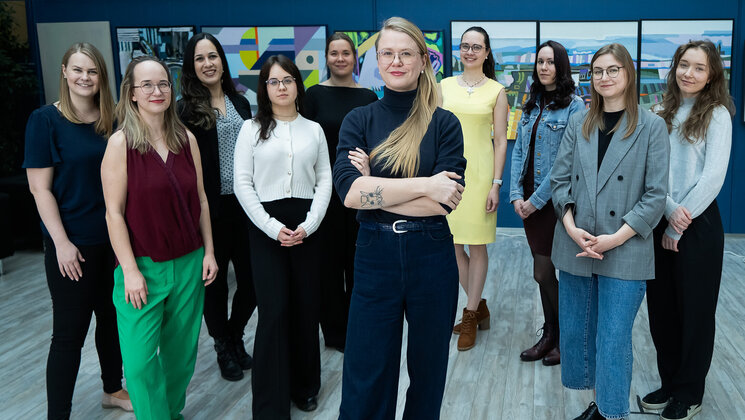-
Faculty of Arts and HumanitiesDean's Office, Faculty of Arts and HumanitiesJakobi 2, r 116-121 51005 Tartu linn, Tartu linn, Tartumaa EST0Institute of History and ArchaeologyJakobi 2 51005 Tartu linn, Tartu linn, Tartumaa EST0Institute of Estonian and General LinguisticsJakobi 2, IV korrus 51005 Tartu linn, Tartu linn, Tartumaa EST0Institute of Philosophy and SemioticsJakobi 2, III korrus, ruumid 302-337 51005 Tartu linn, Tartu linn, Tartumaa EST0Institute of Cultural ResearchÜlikooli 16 51003 Tartu linn, Tartu linn, Tartumaa EST0Institute of Foreign Languages and CulturesLossi 3 51003 Tartu linn, Tartu linn, Tartumaa EST0School of Theology and Religious StudiesÜlikooli 18 50090 Tartu linn, Tartu linn, Tartumaa EST0Viljandi Culture AcademyPosti 1 71004 Viljandi linn, Viljandimaa EST0Professors emeriti, Faculty of Arts and Humanities0Associate Professors emeriti, Faculty of Arts and Humanities0Faculty of Social SciencesDean's Office, Faculty of Social SciencesLossi 36 51003 Tartu linn, Tartu linn, Tartumaa EST0Institute of EducationJakobi 5 51005 Tartu linn, Tartu linn, Tartumaa EST0Johan Skytte Institute of Political StudiesLossi 36, ruum 301 51003 Tartu linn, Tartu linn, Tartumaa EST0School of Economics and Business AdministrationNarva mnt 18 51009 Tartu linn, Tartu linn, Tartumaa EST0Institute of PsychologyNäituse 2 50409 Tartu linn, Tartu linn, Tartumaa EST0School of LawNäituse 20 - 324 50409 Tartu linn, Tartu linn, Tartumaa EST0Institute of Social StudiesLossi 36 51003 Tartu linn, Tartu linn, Tartumaa EST0Narva CollegeRaekoja plats 2 20307 Narva linn, Ida-Virumaa EST0Pärnu CollegeRingi 35 80012 Pärnu linn, Pärnu linn, Pärnumaa EST0Professors emeriti, Faculty of Social Sciences0Associate Professors emeriti, Faculty of Social Sciences0Faculty of MedicineDean's Office, Faculty of MedicineRavila 19 50411 Tartu linn, Tartu linn, Tartumaa ESTInstitute of Biomedicine and Translational MedicineBiomeedikum, Ravila 19 50411 Tartu linn, Tartu linn, Tartumaa ESTInstitute of PharmacyNooruse 1 50411 Tartu linn, Tartu linn, Tartumaa ESTInstitute of DentistryL. Puusepa 1a 50406 Tartu linn, Tartu linn, Tartumaa ESTInstitute of Clinical MedicineL. Puusepa 8 50406 Tartu linn, Tartu linn, Tartumaa ESTInstitute of Family Medicine and Public HealthRavila 19 50411 Tartu linn, Tartu linn, Tartumaa ESTInstitute of Sport Sciences and PhysiotherapyUjula 4 51008 Tartu linn, Tartu linn, Tartumaa ESTProfessors emeriti, Faculty of Medicine0Associate Professors emeriti, Faculty of Medicine0Faculty of Science and TechnologyDean's Office, Faculty of Science and TechnologyVanemuise 46 - 208 51003 Tartu linn, Tartu linn, Tartumaa ESTInstitute of Computer ScienceNarva mnt 18 51009 Tartu linn, Tartu linn, Tartumaa ESTInstitute of GenomicsRiia 23b/2 51010 Tartu linn, Tartu linn, Tartumaa ESTEstonian Marine Institute0Institute of PhysicsInstitute of ChemistryRavila 14a 50411 Tartu linn, Tartu linn, Tartumaa EST0Institute of Mathematics and StatisticsNarva mnt 18 51009 Tartu linn, Tartu linn, Tartumaa EST0Institute of Molecular and Cell BiologyRiia 23, 23b - 134 51010 Tartu linn, Tartu linn, Tartumaa ESTTartu ObservatoryObservatooriumi 1 61602 Tõravere alevik, Nõo vald, Tartumaa EST0Institute of TechnologyNooruse 1 50411 Tartu linn, Tartu linn, Tartumaa ESTInstitute of Ecology and Earth SciencesJ. Liivi tn 2 50409 Tartu linn, Tartu linn, Tartumaa ESTProfessors emeriti, Faculty of Science and Technology0Associate Professors emeriti, Faculty of Science and Technology0Institute of BioengineeringArea of Academic SecretaryHuman Resources OfficeUppsala 6, Lossi 36 51003 Tartu linn, Tartu linn, Tartumaa EST0Area of Head of FinanceFinance Office0Area of Director of AdministrationInformation Technology Office0Administrative OfficeÜlikooli 17 (III korrus) 51005 Tartu linn, Tartu linn, Tartumaa EST0Estates Office0Marketing and Communication OfficeÜlikooli 18, ruumid 102, 104, 209, 210 50090 Tartu linn, Tartu linn, Tartumaa EST0Area of Vice Rector for DevelopmentCentre for Entrepreneurship and InnovationNarva mnt 18 51009 Tartu linn, Tartu linn, Tartumaa EST0University of Tartu Natural History Museum and Botanical GardenVanemuise 46 51003 Tartu linn, Tartu linn, Tartumaa EST0International Cooperation and Protocol Office0University of Tartu MuseumLossi 25 51003 Tartu linn, Tartu linn, Tartumaa EST0Area of RectorRector's Strategy OfficeInternal Audit OfficeArea of Vice Rector for Academic AffairsOffice of Academic Affairs0University of Tartu Youth AcademyUppsala 10 51003 Tartu linn, Tartu linn, Tartumaa EST0Student Union OfficeÜlikooli 18b 51005 Tartu linn, Tartu linn, Tartumaa EST0Centre for Learning and TeachingArea of Vice Rector for ResearchUniversity of Tartu LibraryW. Struve 1 50091 Tartu linn, Tartu linn, Tartumaa EST0Grant Office
Mari Sepp forms a research group to study the cerebellum with an international grant

On 21 January, the recipients of this year's installation grant from the European Molecular Biology Organization (EMBO) were announced. Among the ten scientists is neurobiologist Mari Sepp, whose research covers the fields of developmental biology, evolutionary biology and functional genomics.
The funding will be directed towards research on the cerebellum. This is a brain region that, in addition to controlling movement and balance, also performs important functions in cognition, emotion, social behaviour and language. The cerebellum contains approximately 80% of all nerve cells in the human brain and has played an important role in the evolution of human cognitive abilities.
„The grant provides an opportunity to return to Estonia and start working as a research group leader. I am also looking forward to new collaboration opportunities, which being a member of the EMBO Young Investigator Network provides,“ said Sepp.
Two research directions
Sepp's research project addresses two interrelated topics. First, she wants to find out how genetic changes associated with autism spectrum disorders affect the development and function of cerebellar cells. Autism spectrum disorders affect approximately 1% of people worldwide, causing lifelong difficulties in social interactions, communication, and behaviour. „While increasing evidence indicates the importance of the cerebellum in the pathogenesis of autism, it is still largely unknown how autism-related mutations affect cerebellar development. I want to fill this gap and study the roles of many autism risk genes in cerebellar development in parallel,“ Sepp explained.
Second, she plans to study the evolution of the cerebellum, which Sepp says has historically been an overlooked topic compared to the research on the evolution of the cerebral cortex. „The development of human cognitive abilities has often been associated with the expansion of the cerebral cortex, but studies have shown that the cerebellum also played a significant role in this process, increasing during human evolution,“ Sepp said. In her previous work, she has identified candidate genes whose expression patterns differ in human cerebellar cells from those of other mammals.
In her future work, she plans to study the contributions of these genes to cerebellar development and its human-unique characteristics. Sepp explained that the development of cells in a tissue largely depends on the influence of their immediate neighbors. To study such processes, it is necessary to use models that contain several different cell types. „In our research, we will use both mouse models and mini-models of organs grown in the laboratory, or human organoids. In addition, we will use innovative genomics methods that allow us to describe gene expression patterns in tens of thousands of individual cells simultaneously,“ she added.
Mari Sepp received her doctorate from Tallinn University of Technology in 2012 and is currently a postdoctoral fellow at Heidelberg University. In her doctoral thesis, she studied the roles of a transcription factor (TCF4) associated with autism and schizophrenia in nerve cells under the supervision of Professor Tõnis Timmusk. At Heidelberg University, she works in Professor Henrik Kaessmann's research group, where she leads a research direction focusing on the development and evolution of the mammalian cerebellum. The main focus is on gene expression and regulation. Sepp has received scientific awards and recognition in Estonia, the USA and Germany.
She wants to combine her previous knowledge with new directions when starting independent research. „Unlike my doctoral thesis, which focused on a single gene, new methods allow for parallel functional studies of many genes. Also, unlike my current research, I want to focus not only on gene expression, but also on mapping the morphological and physiological characteristics of cells and tissues in the future,“ Sepp said about her plans as a researcher.
As the leader of the research group she is creating, she considers training a new generation of researchers very important, offering them opportunities to learn and apply modern research methods in addition to recent scientific discoveries.
Ten scientists from six countries
All EMBO installation grant recipients, including Sepp, have demonstrated international research experience and independence. The grant aims to enable young scientists to establish their own research groups. The new EMBO installation grants will help form new research groups in European countries. Two laboratories are located in Croatia, one in the Czech Republic, one in Estonia, two in Greece, three in Poland, and one in Portugal.
„EMBO Installation Grants offer flexible funding, extensive networking opportunities and practical support for life scientists pursuing ambitious research projects,“ said EMBO Director Fiona Watt.
Estonia has been participating in the EMBO Installation Grant Programme since 2006. Each grantee receives 50,000 euros annually for five years. Last year, Hedvig Tamman, Associate Professor of Genetics at the Institute of Molecular and Cell Biology at the University of Tartu, was one of the recipients.
Grantees become part of the EMBO Young Investigator Network, which comprises more than 600 current and former EMBO Young Investigators, Installation Grantees and Global Investigators. Benefits include networking, mentoring, training opportunities, and access to core facilities at the European Molecular Biology Laboratory (EMBL) in Heidelberg, Germany.
Find out more about this year's grantees on the EMBO website.
Read more similar news






